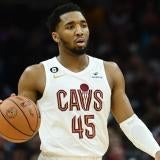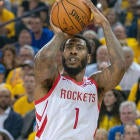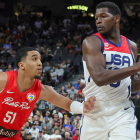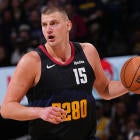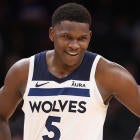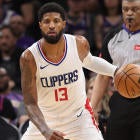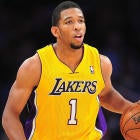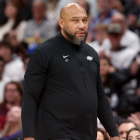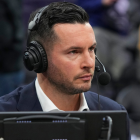Last summer, Draymond Green made a very important distinction in advising the Golden State Warriors on their offseason moves. Don't target 82-game players, Green suggested, but instead focus on 16-game players. To Green's point, the latter can contribute at the highest levels of postseason basketball, and are therefore highly coveted by NBA teams. It is exceedingly rare for many 16-game players to last beyond the opening salvo of free agency, and they typically come at an enormous cost.
Yet the fact remains, teams need to play 82 games before they even have a chance to win those final 16. The Warriors may have had enough star power to focus exclusively on playoff potential, but that is a luxury few current teams can afford. In the tightly bunched post-superteam league that the NBA is morphing into, the regular season is going to become more important than ever in the pursuit of a championship. If a few extra regular-season wins yield home-court advantage, then the player who generated them has already done his part for the postseason.
Those are the kinds of free agents left on the open market. Most of these players will not populate championship rotations. They are 82-game players, too flawed to hold their own against contenders, but skilled enough to help earn their teams such playoff matchups in the first place. At the prices they are going to sign for, that makes them downright bargains.
Here are the 15 best players left on the free-agent market.
1. Iman Shumpert
Shumpert is the lone player on this list who actually did contribute positively to a contender's postseason dreams last season, but he did so shooting an unsustainable 38.1 percent from 3-point range against the Golden State Warriors. If he could do that consistently, he would have signed weeks ago. His defense remains stalwart as ever, but he made only 29.6 percent of his 3-point attempts in the regular season as a Rocket. Shumpert's shot is ultimately a game of roulette. Depending on him means accepting quite a few 1-for-4 shooting nights before landing on the 7-of-13 explosion Shumpert produced in Games 3 through 5 in the semifinals against the Golden State Warriors. A team with enough shooting to weather that storm could still find a steal by signing Shumpert now.
2. Kenneth Faried
Faried has made only 10 3-pointers in his career. As a power forward, where he spent most of his career, that made him virtually unplayable in the modern NBA. But at center, where he spent a career-high 87 percent of his minutes last season between the Rockets and Brooklyn Nets? His high-energy brand of basketball becomes far more appealing. He is a devastating rebounder, particularly on offense, who proved himself a capable pick-and-roll finisher for James Harden last season. So long as Faried is surrounded by shooters, he has proven he can be a very effective player.
3. Jeremy Lin
Backup point guards are out of vogue in a league moving toward fully staggered superstar rotations and forwards taking on more ball-handling responsibilities. Still, Lin's contributions can't be distilled so easily. Point guards who can create their own shot and finish at the rim are rare, and having one on your bench for load management or injury nights is a major weapon. Lin may be beyond the starting portion of his career, but his scoring alone should get him signed, although the veteran is having a tough time finding a new job at the moment.
4. Thabo Sefolosha
Sefolosha's defense isn't quite as stingy as it was during his prime, but his shot has improved enough to offset such a decline. At 36 percent from 3-point range over the past five years on a low-but-acceptable three attempts per 36 minutes, Sefolosha has at least shed the notion that he can be left open. That improvement has come at an inopportune moment, though, considering his age. He is now 35 years old, and teams are naturally afraid of further deteriorating, but if he can hold off Father Time for another year, he can certainly still crack a winning team's rotation.
5. Joakim Noah
Noah's career was left for dead in New York, but like so many ex-Knicks, things got better the moment he left Madison Square Garden. He may have been a backup for the Memphis Grizzlies, but he made the most of his minutes there by sharing his contagious energy with his impressionable young teammates. A Memphis team that picked No. 2 in June's draft actually managed to outscore opponents by 1.8 points per 100 possessions with Noah on the floor last season (per NBA.com). He may need to be kept on a pitch count, but an elite passer, leader and hustle player like Noah still deserves minutes.
6. Ryan Anderson
Anderson was an elite shooter and a poor defender when he signed an $80 million contract three summers ago. Today, he remains an elite shooter and poor defender. He shot only 9 of 40 on 3s last season in 25 games for two rebuilding teams that viewed him more as a salary figure than a player, but if you assume that was an aberration given his track record, his shot and size will always make him a nightmare matchup. He needs to be paired with an elite defensive center, but any team that has one should be open to Anderson as a backup.
7. Vince Carter
Carter has spent his twilight years as a leader for hire, jumping from young team to young team and setting the right example for their prospects. But lost in that venture is the fact that Carter can still play. Now in his 40s (42 to be precise) he should be limited in terms of minutes, but an above-average shooter with strong defensive instincts will always have a place in the NBA.
8. J.R. Smith
Smith played only 11 games last season before his banishment from Cleveland, and hasn't been a double-digit scorer for three seasons, but shooting doesn't age and neither does confidence. Smith has both. He needs to be protected defensively, and he has likely lost all crunch-time privileges thanks to Game 1 of the 2018 NBA Finals, but shooting is sacred in the league's current landscape. Smith will be able to do that forever, with or without consistent playing time, and that is what will get him his next job.
9. Carmelo Anthony
As bad as the past two seasons have been, the ghost of Carmelo Anthony is still worth a shot. Minimum deals are, to some extent, all upside bets. Even if the dream of "Olympic Melo" is dead, the hope that he could recapture some of his old form running bench units is tempting enough to take the chance. The key is Anthony accepting the "bench" portion of that equation. If he has been humbled enough to do so, 15 minutes per night bullying bench forwards is at least feasible.
10. Jonas Jerebko
Centers are a dime a dozen, and guards usually present themselves on the buyout market. But finding cheap forwards, particularly cheap forwards who can shoot, is often the most difficult task a front office has to complete in a given year. Jerebko was roasted by the Toronto Raptors defensively, but most teams are not the Raptors. He can hold his own against opponents that do not employ Kawhi Leonard, and his shooting and size are so rare that Jerebko is a fairly desirable bench piece.
11. Justin Anderson
Anderson has played good defense since the moment he reached the NBA. Offense is the problem. He is an unremarkable ball-handler who hasn't contributed much as a passer, but most damningly, his jump shot has shown precious little improvement in four seasons. Anderson is a good enough defender to stay on the floor as a below-average shooter, but not as a bad one. He has to improve upon his 30.2 percent career mark in the coming years to prove he belongs in this league.
12. Lance Stephenson
Inconsistency, thy name is Lance. Stephenson's best nights won games for the Los Angeles Lakers singlehandedly. The problems came during the other 80-90 percent of the time. Stephenson's turnovers are crippling and his defensive effort was far from dependable. Teams desperate for a high-variance bench option would love Stephenson, but relying on him on a night-to-night basis is a risk few teams seem willing to stomach.
13. Shaun Livingston
Livingston's seemingly immortal mid-range game finally showed signs of fatigue in the postseason. He made only 30 percent of his shots between 10-to-16 feet from the basket in the playoffs, and his percentage on longer 2s fell even further. Livingston is an excellent locker-room presence, and his size at point guard presents problems for opponents on both ends of the floor, but his workload needs to be managed very carefully at this stage of his career.
14. Nene
Nene had a $3.8 million player option with the Rockets, but chose to decline it. That means he wanted one of two things: more money or more playing time. The former is unlikely at this stage of the summer. The latter is intriguing, as his minutes have declined five years in a row, but prior to last year, his per-36 numbers remained largely stable. In a slightly bigger backup role, he could potentially regain some of his old form.
15. Quincy Pondexter
Pondexter, the player, is too good to last this long into free agency. Long, versatile defenders who can make open shots and handle the ball a bit are 16-game players. Pondexter's injury history is what has scared teams away. A stress fracture, multiple knee issues and even an MRSA infection have plagued him for years. Some enterprising team will take a chance on his potential, and if he does manage to stay healthy, he could be the find of the offseason.











